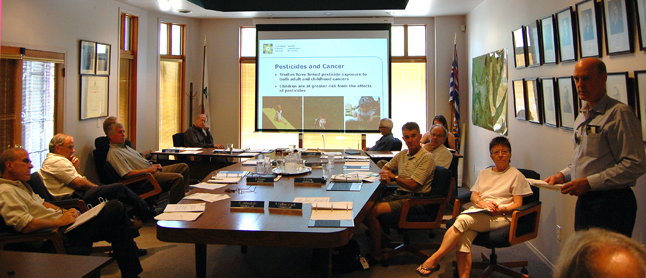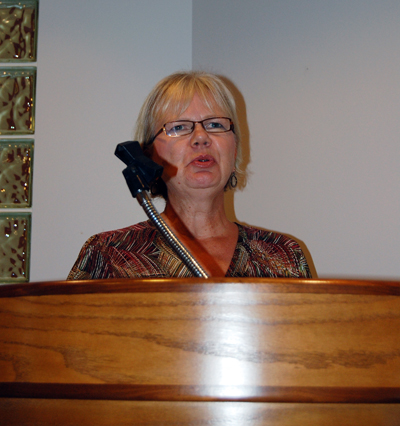
By David F. Rooney
As previously skeptical Councillor Tony Scarcella put it on Tuesday “we’re better off safe than sorry” and with that City Council unanimously agreed to back a bylaw that will ban the use of synthetic cosmetic pesticides on both public and private property.

Scarcella was persuaded that a ban was necessary after a presentation to Council, which was meeting as a Committee of the Whole, by Jerilynn Maki and Dr. Warren Bell of the Canadian Cancer Society.
“Myself, I wasn’t sure but now I’ve made up my mind — we’re better off safe than sorry,” Scarcella said.
“Why do we need more laws?” Maki asked rhetorically. “It’s the right thing to do. Municipalities have a responsibility to protect people’s health.”
And cosmetic pesticides — those chemicals that people apply to their lawns and gardens to kill weeds and critters — do threaten human health.
It may not yet be clinically proven that pesticides cause cancer but there have been enough studies over the last 65 years (roughly the period that chemical pesticides have been used across North America) that show strong links between certain cancers and pesticides.
Dr. Warren Bell, a Salmon Arm physician who is the Canadian Cancer Society’s board leader for medicine and the environment, distributed abstracts of some of the most persuasive studies, including one that looked at cancer precursors in the blood of French farmers who regularly used pesticides. The study was conducted over nine years and showed that “their blood was loaded” with cancer presursors.
“This is not trust-me-I’m-a-doctor stuff,” he said. “It’s actual blood-based research.”
The cancers believed linked to pesticides include non-Hodgkins lymphomas, prostate cancer, breast cancer and other dire illnesses. There is also new evidence that pesticide use may be linked to the upsurge in attention deficit disorder diagnoses among children. It’s worth noting that all medical health officers with the Interior Health Authority publicly support a ban.
“This is a fairly important issue,” said Councillor Phil Welock.
He said he wants to comply with a ban and he bets many others do, too. But what do you do with major corporations such as Canadian Pacific?
“I can do it (adhere to a ban) but I want them to do it, too,” he said, noting that CP recently sprayed its right-of-ways with 2,4-D.
Councillor Antoinette Halberstadt said staff have been asked to work on the draft bylaw that was presented in a memo by Penny Page Brittin, the City’s new Environmental Coordinator, and develop a public education plan.
“That’s going to be key,” said Mayor David Raven, adding that the communication program should be addressed to people in simple, easy-to-understand language and staff should give some thought to finding a way to actually show people how an ideal pesticide-free yard looks.
“This is a real opportunity for Revelstoke to have a very strong bylaw that includes the golf course,” Maki said after the CoW meeting. “The golf course is already moving towards that (goal of being pesticide-free) — let’s help them do that.”
North Columbia Environmental Society President Sarah Newton agreed saying: “I really hope they ultimately decide to include the golf course. If we can afford to have a golf course we can afford to do it right.”
“Doing it right” will require public consultation and public education and will still demand will power on the part of Council.
Maki warned that the pesticide lobby is powerful and does not regard any community as being too small to escape its pressure. Local environmentalists, doctors and others have already been attacked, threatened and vilified in propaganda from pro-pesticide lobbyists and more pressure may yet be exerted, particularly as Council gets down to dealing with the nuts and bolts of the bylaw.
In its current form, the draft bylaw bans the use of synthetic cosmetic pesticides on public and private property. The City has had a voluntary ban for several months and School District 19 has not sprayed its fields and playgrounds for years. As well, the golf course no longer uses synthetic pesticides but would like to continue applying fungicides on the fairways and greens. There is likely to be future discussion around that point.
Enforcement is always an issue and Councillor Peter Frew said the bylaw would likely be weak unless it contains a range of penalties, perhaps graduated ones to deter people from using pesticides. Some other BC municipalities with strong bylaws have graduated penalties ranging from $500 to $5,000.
The bylaw will not apply to agriculture or forestry. Nor can it be applied to the sale of pesticides, as that requires provincial regulation. However, only Home Hardware still sells pesticides in Revelstoke and it would prefer not to sell them at all.
City staff have until the end of December to present Council with the plans for a public education program and a more complete bylaw. Council would like to see it enacted in time for the start of the 2011 growing season.
“We want it to work,” said Councillor Chris Johnston. “If we’re going to do a bylaw, let’s do it right and make it legal, sensible and enforceable.”
To read a memo on this issue by Engineering and Public Works Director Brian Mallett, please go here.



